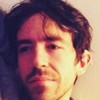Advertisement
Advertisement
Andrew Smith: I teach a group of high school students, who are non-English speaking, from all over the world. A few years ago I started getting kids coming in from Syria, during probably the worst of the Syrian civil war. The first boy was 15. His family had left everything they owned in Syria, went across the border into Lebanon, into refugee camps, and then to the United States. And within days he was taking high school classes with thousands of Californians.I wanted to tell a story like that, about somebody who found himself here, and then was confronted with all of the strangeness that is so pervasive here.Your villains are often big corporations with military ties. Coincidence or anti-capitalist conspiracy?
Definitely not a coincidence. I think we're getting to the point—we're maybe even past the tipping point—where as a species, human beings have chosen to do things with little concern for their long-run effects. I think there are plenty of people out there who sit back passively, shake their heads and say, as is so often said in Grasshopper Jungle, "That's probably not a good idea." And yet we just keep doing those things over and over. So it's a really important element in the things that I write.You also don't seem afraid to explore the sex lives of teen boys—everything from the confusion of being attracted to your gay best friend to the trauma of sexual assault during war.
There are an awful lot of things that people are, for whatever reason, timid to talk about, and sexuality in adolescence is one. Kids ask me about that all the time. Especially boys. They'll quietly say things like "Wow, you wrote about this. How do you feel about that? How do your kids feel about this stuff?" They're trying to feel out some kind of an answer, because they're curious. I think these are natural experiences during adolescence. So I tell them I'm not afraid of words, of talking about anything that I think is real or pertinent.On the flip side, it sometimes seems like there isn't much of a way into your books for female readers. Where are all the women in your work?
I was raised in a family with four boys, and I absolutely did not know anything about girls at all. I have a daughter now; she's 17. When she was born, that was the first girl I ever had in my life. I consider myself completely ignorant to all things woman and female. I'm trying to be better though.A lot of The Alex Crow is really about the failure of male societies. In all of the story threads, there are examples of male-dominated societies that make critical errors, whether it's the army that Ariel falls in with at the beginning, or the refugee camp, or Camp Merrie-Seymour for boys, or the doomed arctic expedition, they're all examples of male societies that think that they're doing some kind of noble mission, and they're failing miserably.Follow Hugh Ryan on Twitter.
